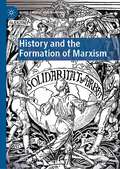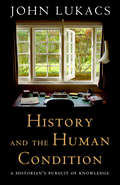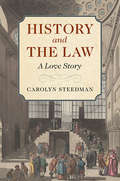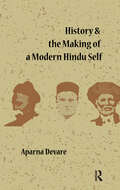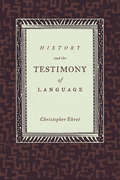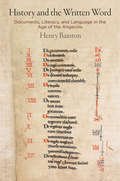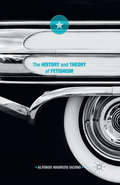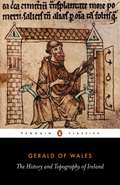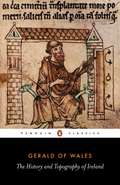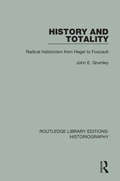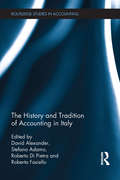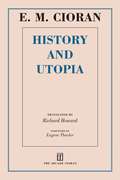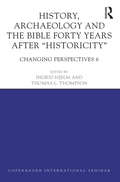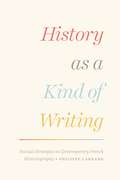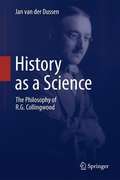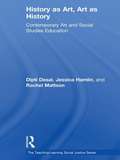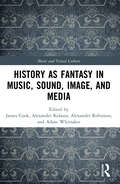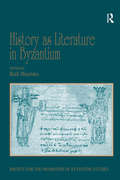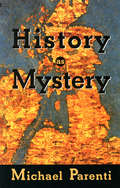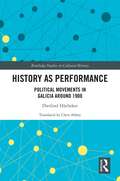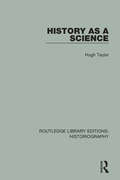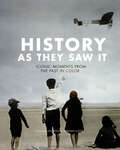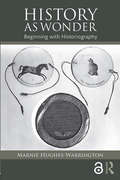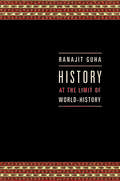- Table View
- List View
History and the Formation of Marxism (Marx, Engels, and Marxisms)
by Bertel NygaardThis book redefines the relationship between Marxism and history. At its roots, Marxism was aimed at analyzing society in order to change it, reflecting on the past to create the ‘poetry of the future.’ No single event of the past was as important to early Marxists as the French Revolution of 1789. Studying the varying uses of the history of that past event among Karl Marx, Friedrich Engels, and prominent European Marxists before 1914 (Karl Kautsky, V.I. Lenin, and others), this book argues that we should take the historiography of concrete past events seriously. It was not only an auxiliary element of Marxism, but a core constitutive element in its formation. Thus, this book calls for transcending traditional approaches to Marxism as a fixed set of social theories combined with strategies for the present and future. Important to students of Marxism, the labor movement, and the French Revolution alike, this study contains refreshing perspectives on the interplay between past, present, and future and on the role of states, social classes, socio-economic determination, and political organization in history.
History and the Human Condition: A Historian's Pursuit of Knowledge
by John LukacsIn a career spanning more than sixty-five years, John Lukacs has established himself as one of our most accomplished historians. Now, in the stimulating book History and the Human Condition, Lukacs offers his profound reflections on the very nature of history, the role of the historian, the limits of knowledge, and more.Guiding us on a quest for knowledge, Lukacs ranges far and wide over the past two centuries. The pursuit takes us from Alexis de Tocqueville to the atomic bomb, from American &“exceptionalism&” to Nazi expansionism, from the closing of the American frontier to the passing of the modern age.Lukacs&’s insights about the past have important implications for the present and future. In chronicling the twentieth-century decline of liberalism and rise of conservatism, for example, he forces us to rethink the terms of the liberal-versus-conservative debate. In particular, he shows that what passes for &“conservative&” in the twenty-first century often bears little connection to true conservatism.Lukacs concludes by shifting his gaze from the broad currents of history to the world immediately around him. His reflections on his home, his town, his career, and his experiences as an immigrant to the United States illuminate deeper truths about America, the unique challenges of modernity, the sense of displacement and atomization that increasingly characterizes twenty-first-century life, and much more. Moving and insightful, this closing section focuses on the human in history, masterfully displaying how right Lukacs is in his contention that history, at its best, is personal and participatory.History and the Human Condition is a fascinating work by one of the finest historians of our time. More than that, it is perhaps John Lukacs&’s final word on the great themes that have defined him as a historian and a writer.
History and the Law: A Love Story
by Carolyn SteedmanFocusing on everyday legal experiences, from that of magistrates, novelists and political philosophers, to maidservants, pauper men and women, down-at-heel attorneys and middling-sort wives in their coverture, History and the Law reveals how people thought about, used, manipulated and resisted the law between the eighteenth and the twentieth centuries. Supported by clear, engaging examples taken from the historical record, and from the writing of historians including Laurence Sterne, William Godwin, and E. P. Thompson, who each had troubled love affairs with the law, Carolyn Steedman puts the emphasis on English poor laws, copyright law, and laws regarding women. Evocatively written and highly original, History and the Law accounts for historians' strange ambivalent love affair with the law and with legal records that appear to promise access to so many lives in the past.
History and the Making of a Modern Hindu Self
by Aparna DevareTaking the contentious debates surrounding historical evidence and history writing between secularists and Hindu nationalists as a starting point, this book seeks to understand the origins of a growing historical consciousness in contemporary India, especially amongst Hindus. The broad question it poses is: Why has ‘history’ become such an important site of identity, conflict and self-definition amongst modern Hindus, especially when Hinduism is known to have been notoriously impervious to history? As modern ideas regarding notions of history came to India with colonialism, it turns to the colonial period as the ‘moment of encounter’ with such ideas. The book examines three distinct moments in the Hindu self through the lives and writings of lower-caste public figure Jotiba Phule, ‘moderate’ nationalist M. G. Ranade and Hindu nationalist V. D. Savarkar. Through a close reading of original writings, speeches and biographical material, it is demonstrated that these three individuals were engaged with a modern historical and rationalist approach. However, the same material is also used to argue that Phule and Ranade viewed religion as living, contemporaneous and capable of informing both their personal and political lives. Savarkar, the ‘explicitly Hindu’ leader, on the contrary, held Hindu practices and traditions in contempt, confining them to historical analysis while denying any role for religion as spirituality or morality in contemporary political life. While providing some historical context, this volume highlights the philosophical/ political ideas and actions of the three individuals discussed. It integrates aspects of their lives as central to understanding their politics.
History and the Testimony of Language
by Christopher EhretThis book is about history and the practical power of language to reveal historical change. Christopher Ehret offers a methodological guide to applying language evidence in historical studies. He demonstrates how these methods allow us not only to recover the histories of time periods and places poorly served by written documentation, but also to enrich our understanding of well-documented regions and eras. A leading historian as well as historical linguist of Africa, Ehret provides in-depth examples from the language phyla of Africa, arguing that his comprehensive treatment can be applied by linguistically trained historians and historical linguists working with any language and in any area of the world.
History and the Written Word: Documents, Literacy, and Language in the Age of the Angevins (The Middle Ages Series)
by Henry BaintonComing upon the text of a document such as a charter or a letter inserted into the fabric of a medieval chronicle and quoted in full or at length, modern readers might well assume that the chronicler is simply doing what good historians have always done—that is, citing his source as evidence. Such documentary insertions are not ubiquitous in medieval historiography, however, and are in fact particularly characteristic of the history-writing produced by the Angevins in England and Northern France in the later twelfth century.In History and the Written Word, Henry Bainton puts these documentary gestures center stage in an attempt to understand what the chroniclers were doing historiographically, socially, and culturally when they transcribed a document into a work of history. Where earlier scholars who have looked at the phenomenon have explained this increased use of documents by considering the growing bureaucratic state and an increasing historiographical concern for documentary evidence, Bainton seeks to resituate these histories, together with their authors and users, within literate but sub-state networks of political power. Proposing a new category he designates "literate lordship" to describe the form of power with which documentary history-writing was especially concerned, he shows how important the vernacular was in recording the social lives of these literate lords and how they found it a particularly appropriate medium through which to record their roles in history.Drawing on the perspectives of modern and medieval narratology, medieval multilingualism, and cultural memory, History and the Written Word argues that members of an administrative elite demonstrated their mastery of the rules of literate political behavior by producing and consuming history-writing and its documents.
The History and Theory of Fetishism (Marx, Engels, and Marxisms)
by Alfonso Maurizio IaconoThe History and Theory of Fetishism, the expanded version of Iacono's enduring classic Teorie del feticismo and available for the first time in English, aims to provide the historical context necessary to understanding the concept of "fetishism" and offers an overview of the ideologies, prejudices, and critical senses that shaped the Western observer's view of otherness and of his own world. Iacono examines the moment when the Western observer turned his colonizing and evangelizing gaze to continents such as Africa and the Americas, while attempting to simultaneously destabilize and look at his own world critically.
The History and Topography of Ireland
by Giraldus Cambrensis Gerald Of Wales John O'MearaGerald of Wales was among the most dynamic and fascinating churchmen of the twelfth century. A member of one of the leading Norman families involved in the invasion of Ireland, he first visited there in 1183 and later returned in the entourage of Henry II. The resulting Topographia Hiberniae is an extraordinary account of his travels. Here he describes landscapes, fish, birds and animals; recounts the history of Ireland's rulers; and tells fantastical stories of magic wells and deadly whirlpools, strange creatures and evil spirits. Written from the point of view of an invader and reformer, this work has been rightly criticized for its portrait of a primitive land, yet it is also one of the most important sources for what is known of Ireland during the Middle Ages.
The History and Topography of Ireland
by Gerald of WalesGerald of Wales was among the most dynamic and fascinating churchmen of the twelfth century. A member of one of the leading Norman families involved in the invasion of Ireland, he first visited there in 1183 and later returned in the entourage of Henry II. The resulting Topographia Hiberniae is an extraordinary account of his travels. Here he describes landscapes, fish, birds and animals; recounts the history of Ireland's rulers; and tells fantastical stories of magic wells and deadly whirlpools, strange creatures and evil spirits. Written from the point of view of an invader and reformer, this work has been rightly criticized for its portrait of a primitive land, yet it is also one of the most important sources for what is known of Ireland during the Middle Ages.
History and Totality: Radical Historicism From Hegel to Foucault (Routledge Library Editions: Historiography)
by John GrumleyIn this work, originally published in 1989, the author establishes a tradition of radical historicism from Hegel to the Budapenst School. He charts both its continuous evolution from the early 19th century to the late 20thh, and its transformation in the context of European social, economic and cultural change. Through a reappraisal of historical interpretation from Hegel to Foucault, the book demonstrates the contemporary relevance of radical historicism. It includes detailed analyses of Marx, Dilthey, Simmel, Weber, Lukácks, Horkheimer, Adorno and Habermas.
The History and Tradition of Accounting in Italy: Tbc (Routledge Studies in Accounting)
by David Alexander, Stefano Adamo, Roberto Di Pietra and Roberta FasielloItalian accounting has a long and honourable tradition of theoretical and applied analysis of the accounting and reporting function, perceived and defined much more broadly than in the Anglo-Saxon tradition. The high point of this perhaps, is the creation of what is known as Economia Aziendale (EA). The antecedents, genesis and later developments are presented here in detail by highly knowledgeable specialists in the field. EA takes as a prerequisite the necessity of the business (entity/azienda) to ensure its own long-run survival. This requires that the necessary resources are retained and preserved, so operating capital maintenance, by definition future-oriented, is essential. It requires a focus on the particular business organization, entity-specific and consistent with today's notion of the business model. Entity-specific information relevant to current and future cash flows is a necessary pre-requisite for ensuring long-run survival, which historical cost accounting, or fair value (being market-specific not entity-specific) satisfactorily achieve. Flexibility of valuation and of reporting, always relevant to the specific asset at the specific time in the specific place, is a necessary condition for effective management. This is exactly the focus of EA and its analysis and tradition. Scholars and advanced students of international regulation and accounting, as well as accounting history, will find this an invaluable guide to a vibrant, scholarly tradition of great practical relevance today.
History and Utopia
by Richard Howard E. M. Cioran Eugene Thacker"Only a monster can allow himself the luxury of seeing things as they are," writes E. M. Cioran, the Romanian-born philosopher who has rightly been compared to Samuel Beckett.In History and Utopia, Cioran the monster writes of politics in its broadest sense, of history, and of the utopian dream. His views are, to say the least, provocative. In one essay he casts a scathing look at democracy, that "festival of mediocrity"; in another he turns his uncompromising gaze on Russia, its history, its evolution, and what he calls "the virtues of liberty." In the dark shadow of Stalin and Hitler, he writes of tyrants and tyranny with rare lucidity and convincing logic. In "Odyssey of Rancor," he examines the deep-rooted dream in all of us to "hate our neighbors," to take immediate and irremediable revenge. And, in the final essay, he analyzes the notion of the "golden age," the biblical Eden, the utopia of so many poets and thinkers.
History and Value: The Clarendon Lectures and the Northcliffe Lectures 1987
by Frank KermodeUniversity lectures on literature and art
History, Archaeology and The Bible Forty Years After Historicity: Changing Perspectives 6
by Thomas L. Thompson Ingrid HjelmIn History, Archaeology and the Bible Forty Years after "Historicity", Hjelm and Thompson argue that a ‘crisis’ broke in the 1970s, when several new studies of biblical history and archaeology were published, questioning the historical-critical method of biblical scholarship. The crisis formed the discourse of the Copenhagen school’s challenge of standing positions, which—together with new achievements in archaeological research—demand that the regional history of ancient Israel, Judaea and Palestine be reconsidered in all its detail. This volume examines the major changes that have taken place within the field of Old Testament studies since the ground breaking works of Thomas Thompson and John van Seters in 1974 and 1975 (both republished in 2014). The book is divided in three sections: changing perspectives in biblical studies, history and cult, and ideology and history, presenting new articles from some of the field’s best scholars with comprehensive discussion of historical, archaeological, anthropological, cultural and literary approaches to the Hebrew Bible and Palestine’s history. The essays question: "How does biblical history relate to the archaeological history of Israel and Palestine?" and "Can we view the history of the region independently of a biblical perspective?" by looking at the problem from alternative angles and questioning long-held interpretations. Unafraid to break new ground, History, Archaeology and the Bible Forty Years after "Historicity" is a vital resource to students in the field of Biblical and East Mediterranean Studies, and anyone with an interest in the archaeology, history and religious development in Palestine and the ancient Near East.
History as a Kind of Writing: Textual Strategies in Contemporary French Historiography
by Philippe CarrardIn academia, the traditional role of the humanities is being questioned by the “posts”—postmodernism, poststructuralism, and postfeminism—which means that the project of writing history only grows more complex. In History as a Kind of Writing, scholar of French literature and culture Philippe Carrard speaks to this complexity by focusing the lens on the current state of French historiography. Carrard’s work here is expansive—examining the conventions historians draw on to produce their texts and casting light on views put forward by literary theorists, theorists of history, and historians themselves. Ranging from discussions of lengthy dissertations on 1960s social and economic history to a more contemporary focus on events, actors, memory, and culture, the book digs deep into the how of history. How do historians arrange their data into narratives? What strategies do they employ to justify the validity of their descriptions? Are actors given their own voice? Along the way, Carrard also readdresses questions fundamental to the field, including its necessary membership in the narrative genre, the presumed objectivity of historiographic writing, and the place of history as a science, distinct from the natural and theoretical sciences.
History as a Science
by Jan Van DussenSince its appearance in 1981 History as a Science has been welcomed as a coherent and comprehensive review and analysis of the many aspects of Collingwood's philosophy of history, the development of his views, and their reception. The book was the first to pay extensive attention to Collingwood's unpublished manuscripts, and to his work as an archaeologist and historian. With the publication of this volume Jan van der Dussen, opened up a new angle in Collingwood studies. The republication of this volume meets an increasing demand to make the book available for future Collingwood scholars, and people interested in Collingwood's philosophy. Apart from verbal changes to improve readability and a new pagination, the manuscript is the same as the original.
History as Art, Art as History: Contemporary Art and Social Studies Education
by Dipti Desai Jessica Hamlin Rachel MattsonHistory as Art, Art as History pioneers methods for using contemporary works of art in the social studies and art classroom to enhance an understanding of visual culture and history. The fully-illustrated interdisciplinary teaching toolkit provides an invaluable pedagogical resource—complete with theoretical background and practical suggestions for teaching U.S. history topics through close readings of both primary sources and provocative works of contemporary art. History as Art, Art as History is an experientially grounded, practically minded pedagogical investigation meant to push teachers and students to think critically without sacrificing their ability to succeed in a standards-driven educational climate. Amid the educational debate surrounding rigid, unimaginative tests, classroom scripts, and bureaucratic mandates, this innovative book insists on an alternate set of educational priorities that promotes engagement with creative and critical thinking. Features include: A thought-provoking series of framing essays and interviews with contemporary artists address the pivotal questions that arise when one attempts to think about history and contemporary visual art together. An 8-page, full color insert of contemporary art, plus over 50 black and white illustrations throughout. A Teaching Toolkit covering major themes in U.S. history provides an archive of suggested primary documents, plus discussion suggestions and activities for putting theory into practice. Teaching activities keyed to the social studies and art curricula and teaching standards Resources include annotated bibliographies for further study and lists of arts and media organizations. This sophisticated yet accessible textbook is a must-read resource for any teacher looking to draw upon visual and historical texts in their teaching and to develop innovative curriculum and meaningful student engagement.
History as Fantasy in Music, Sound, Image, and Media (Music and Visual Culture)
by James Cook, Alexander Kolassa, Alexander Robinson, and Adam WhittakerExploring how music is used to portray the past in a variety of media, this book probes the relationship between history and fantasy in the imagination of the musical past. The volume brings together essays from multidisciplinary perspectives, addressing the use of music to convey a sense of the past in a wide range of multimedia contexts, including television, documentaries, opera, musical theatre, contemporary and historical film, videogames, and virtual reality. With a focus on early music and medievalism, the contributors theorise the role of music and sound in constructing ideas of the past. In three interrelated sections, the chapters problematise notions of historical authenticity on the stage and screen; theorise the future of musical histories in immersive and virtual media; and explore sound’s role in more fantastical appropriations of history in television and videogames. Together, they poseprovocative questions regarding our perceptions of ‘early’ music and the sensory experience of distant history. Offering new ways to understand the past at the crossroads of musical and visual culture, this collection is relevant to researchers across music, media, and historical and cultural studies.
History as Literature in Byzantium: Papers from the Fortieth Spring Symposium of Byzantine Studies, University of Birmingham, April 2007 (Publications of the Society for the Promotion of Byzantine Studies #15)
by Ruth MacridesAlthough perceived since the sixteenth century as the most impressive literary achievement of Byzantine culture, historical writing nevertheless remains little studied as literature. Historical texts are still read first and foremost for nuggets of information, as main sources for the reconstruction of the events of Byzantine history. Whatever can be called literary in these works has been considered as external and detachable from the facts. The 'classical tradition' inherited by Byzantine writers, the features that Byzantine authors imitated and absorbed, are regarded as standing in the way of understanding the true meaning of the text and, furthermore, of contaminating the reliability of the history. Chronicles, whose language and style are anything but classicizing, have been held in low esteem, for they are seen as providing a mere chronological exposition of events. This book presents a set of articles by an international cast of contributors, deriving from papers delivered at the 40th annual Spring Symposium of Byzantine Studies. They are concerned with historical and visual narratives that date from the sixth to the fourteenth century, and aim to show that literary analyses and the study of pictorial devices, far from being tangential to the study of historical texts, are preliminary to their further study, exposing the deeper structures and purposes of these texts.
History as Mystery
by Michael ParentiEssays on how history's victors distort and suppress the documentary record in order to perpetuate their power and privilege, and how historians are influenced by the professional and class environment in which they work. "Michael Parenti, always provocative and eloquent, gives us a lively as well as valuable critique of orthodoxy posing as 'history. '"-Howard Zinn"Solid if surely controversial stuff. "- Kirkus Table of Contents Prologue: Against the Mainstream History as Miseducation Mainstream Orthodoxy The Hunt for Real History Textbooks: America the Beautiful For Business, Against Labor The School as a Tool Priests and Pagans, Saints and Slaves Triumph of the One True Faith Silencing the Pagans Accepting the Powers that Be Affluent Believers Saints For Slavery Bishops and Barbarians, Jezebels and Jews The Myth of the Devout Peasant The Curse of Eve The Burning of Books Preparing the Holocaust History in the Faking Suppression at the Point of OriginCold War in the Archives Classified History, USA Listening to the Muted Masses In Ranke's Footsteps His Majesty's Servant An Aristocratic Profession' Purging the Reds Publishing and Privishing' Marketing the Right Stuff The Strange Death of President Zachary Taylor, a Study in the Manufacture of Mainstream History Examining the Examination Confrontation with the Slavocracy A lethal Dose of Cherries and Milk? Honorable Men and Official History Against Psychopolitics Depoliticizing the Political Dubious Clinical Data Lenin as Oedipus The Compulsive Hoover The Political Hoover When the Political Becomes Personal Afterword
History as Performance: Political Movements in Galicia Around 1900 (Routledge Studies in Cultural History #93)
by Dietlind HüchtkerThis study analyzes history as performance: as the interaction of actors, plays, stages and enactments. By this, it examines women’s politics in Habsburg Galicia around 1900: a Polish woman active in the peasant movement, a Ukrainian feminist, and a Jewish Zionist. It shows how the movements constructed essentialistically regarded collectives, experience as a medially comprehensible form of credibility, and a historically based inevitability of change, and legitimized participation and intervention through social policy and educational practices. Traits shared by the movements included the claim to interpretive sovereignty, the ritualization of participation, and the establishment of truths about past and future.
History As A Science (Routledge Library Editions: Historiography)
by Hugh TaylorExamining why the study of history as a science was not as advanced as other disciplines, the author of this book, originally published in 1933, examines the arguments in the controversy of what the object of history should be. He then discusses the impact of the study of history on government, war and revolution .
History as They Saw It: Iconic Moments from the Past in Color
by Wolfgang Wild Jordan LloydThis revolutionary photography collection is as close to time travel as it gets. Featuring 120 historic black-and-white photographs thoroughly restored and rendered in color, this book illuminates some of the most iconic moments in history, from the sinking of the Titanic to the construction of the Golden Gate Bridge. Brought to life with vibrant color, these incredible images effectively blur the distinction between past and present and bring history within arm's reach. With a timeline spanning more than 100 years, from 1839 to 1949, this unique ebook will amaze history and photography buffs alike, offering new perspectives on significant moments of the 19th and 20th centuries.
History as Wonder: Beginning with Historiography
by Marnie Hughes-WarringtonHistory and Wonder is a refreshing new take on the idea of history that tracks the entanglement of history and philosophy over time through the key idea of wonder. From Ancient Greek histories and wonder works, to Islamic curiosities and Chinese strange histories, through to European historical cabinets of curiosity and on to histories that grapple with the horrors of the Holocaust, Marnie Hughes-Warrington unpacks the ways in which historians throughout the ages have tried to make sense of the world, and to change it. This book considers histories and historians across time and space, including the Ancient Greek historian Polybius, the medieval texts by historians such as Bede in England and Ibn Khaldun in Islamic Historiography, and the more recent works by Martin Heidegger, Luce Irigaray and Ranajit Guha among others. It explores the different ways in which historians have called upon wonder to cross boundaries between the past and the present, the universal and the particular, the old and the new, and the ordinary and the extraordinary. Promising to both delight and unsettle, it shows how wonder works as the beginning of historiography. Accessible, engaging and wide-ranging, History as Wonder provides an original addition to the field of historiography that is ideal for those both new to and familiar with the study of history.
History at the Limit of World-History (Italian Academy Lectures)
by Ranajit GuhaThe past is not just, as has been famously said, another country with foreign customs: it is a contested and colonized terrain. Indigenous histories have been expropriated, eclipsed, sometimes even wholly eradicated, in the service of imperialist aims buttressed by a distinctly Western philosophy of history. Ranajit Guha, perhaps the most influential figure in postcolonial and subaltern studies at work today, offers a critique of such historiography by taking issue with the Hegelian concept of World-history. That concept, he contends, reduces the course of human history to the amoral record of states and empires, great men and clashing civilizations. It renders invisible the quotidian experience of ordinary people and casts off all that came before it into the nether-existence known as "Prehistory."On the Indian subcontinent, Guha believes, this Western way of looking at the past was so successfully insinuated by British colonization that few today can see clearly its ongoing and pernicious influence. He argues that to break out of this habit of mind and go beyond the Eurocentric and statist limit of World-history historians should learn from literature to make their narratives doubly inclusive: to extend them in scope not only to make room for the pasts of the so-called peoples without history but to address the historicality of everyday life as well. Only then, as Guha demonstrates through an examination of Rabindranath Tagore's critique of historiography, can we recapture a more fully human past of "experience and wonder."
